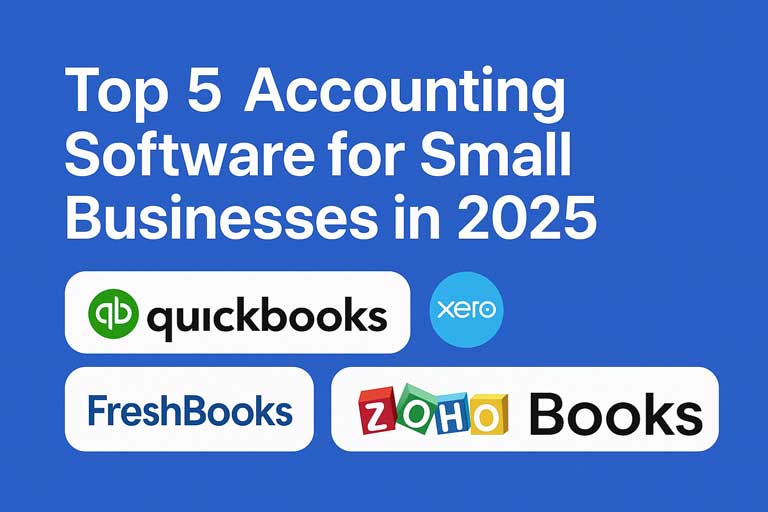
Running a small business requires wearing many hats. Beyond delivering products or services, owners must also handle sales, marketing, operations, and one of the most crucial aspects—accounting. Proper financial management is the backbone of sustainable growth, but it can quickly become overwhelming without the right tools.
That’s where accounting software comes in. These platforms streamline bookkeeping, automate invoicing, manage expenses, and provide clear financial insights—all without requiring a degree in accounting. In 2025, small businesses have more options than ever, ranging from free, simple apps to powerful cloud-based systems.
In this article, we’ll explore the top 5 accounting software for small businesses in 2025, highlighting their features, benefits, and ideal use cases.
1. QuickBooks Online – Best Overall
When it comes to small business accounting, QuickBooks Online remains the industry leader. Developed by Intuit, it offers one of the most comprehensive feature sets available.
Key Features:
- Invoicing, expense tracking, and bill management.
- Automated bank reconciliation and real-time reporting.
- Payroll and tax management (as add-ons).
- Integration with hundreds of business apps.
Why It’s Great for Small Businesses:
QuickBooks Online is designed to scale with your company. Whether you’re a freelancer just starting out or a growing small business with employees, its flexibility ensures you won’t outgrow it anytime soon.
Best for: Businesses seeking a trusted, all-in-one accounting platform with powerful reporting and scalability.
Pricing: Starts at around $35/month, with higher tiers offering payroll and advanced analytics.
2. Xero – Best for Cloud-Native Collaboration
If collaboration and mobility are top priorities, Xero is a top contender. This cloud-first software provides real-time financial updates and easy sharing with accountants or team members, making it a favorite for businesses with remote teams.
Key Features:
- Bank feeds and reconciliation.
- Over 1,000 third-party integrations.
- Multi-currency support.
- Sleek, modern user interface.
Why It’s Great for Small Businesses:
Xero shines for businesses that want a modern, user-friendly platform. Its collaboration features mean business owners, bookkeepers, and accountants can all work seamlessly in the same space.
Best for: Cloud-savvy teams that need remote access and easy collaboration.
Pricing: Plans start at around $15/month.
3. FreshBooks – Best for Service-Based Businesses
For freelancers, consultants, and service-based businesses, FreshBooks offers an intuitive accounting solution that emphasizes simplicity. Unlike traditional accounting software, FreshBooks is built with non-accountants in mind.
Key Features:
- Customizable invoicing and payment tracking.
- Time tracking and project management.
- Expense management and receipt capture.
- Client portal for transparency.
Why It’s Great for Small Businesses:
FreshBooks eliminates the intimidation factor of accounting. It’s straightforward, mobile-friendly, and perfectly suited for professionals who bill clients by the hour or project.
Best for: Solo entrepreneurs, freelancers, and agencies offering services.
Pricing: Plans start at around $19/month.
4. Zoho Books – Best for Affordability and Integration
Part of the Zoho ecosystem, Zoho Books is an affordable yet powerful accounting tool. It integrates seamlessly with other Zoho applications such as CRM, inventory, and HR, making it an appealing choice for businesses already using Zoho products.
Key Features:
- Automated workflows and bank reconciliation.
- Inventory tracking and purchase order management.
- Multi-currency handling.
- Extensive mobile app support.
Why It’s Great for Small Businesses:
Zoho Books offers excellent value for money, delivering advanced features at a fraction of the cost of larger competitors. It’s also particularly attractive for businesses in regions where affordability and scalability are key.
Best for: Entrepreneurs on a budget or businesses already invested in the Zoho ecosystem.
Pricing: Starts at $9–$15/month, making it one of the most affordable options.
5. Wave – Best Free Option
For startups and solopreneurs with limited budgets, Wave is a game-changer. Unlike most software, it provides essential accounting tools at no cost, with optional paid add-ons for payment processing and payroll.
Key Features:
- Free invoicing and expense tracking.
- Receipt scanning and basic reporting.
- Optional payroll and credit card processing.
- Cloud-based access from any device.
Why It’s Great for Small Businesses:
Wave removes the cost barrier for small business owners. While it may not have the advanced capabilities of QuickBooks or Xero, it’s more than enough for micro-businesses that need to keep their finances organized.
Best for: Freelancers, solopreneurs, and startups seeking a free, simple accounting tool.
Pricing: Free for core features; paid add-ons available.
Quick Comparison Table
| Software | Best For | Price Range | Key Highlights |
|---|---|---|---|
| QuickBooks Online | All-around, scalable accounting | From ~$35/month | Feature-rich, trusted brand, excellent integrations |
| Xero | Cloud-savvy teams & collaboration | From ~$15/month | Modern UI, remote access, strong collaboration tools |
| FreshBooks | Service-based freelancers/agencies | From ~$19/month | Intuitive invoicing, time tracking, client portals |
| Zoho Books | Budget-conscious & Zoho users | From ~$9–$15/month | Affordable, integrates with Zoho apps, automation-ready |
| Wave | Freelancers & tight budgets | Free (core features) | Free essentials, optional add-ons for payroll/payments |
How to Choose the Right Accounting Software
With so many great options, the best choice depends on your unique business needs. Here are some tips to guide your decision:
- Consider Your Business Model
- Service-based business? FreshBooks is a natural fit.
- Product-based with inventory? QuickBooks or Zoho Books might serve better.
- Evaluate Your Budget
- On a tight budget? Wave offers a free solution.
- Looking for value without compromise? Xero and Zoho Books strike a balance.
- Think About Collaboration
- If you work with external accountants or remote teams, Xero’s collaboration features stand out.
- Plan for Growth
- Businesses anticipating rapid growth should choose scalable platforms like QuickBooks Online.
Final Thoughts
In today’s fast-paced world, small businesses can’t afford to overlook the importance of reliable accounting software. The right tool not only saves time but also provides critical insights into the financial health of your company.
- Choose QuickBooks Online if you want the most comprehensive solution.
- Opt for Xero if collaboration and cloud access are priorities.
- Select FreshBooks if you’re a freelancer or service-based professional.
- Go with Zoho Books for affordability and seamless integration.
- Try Wave if you’re just starting out and need a free solution.
No matter which option you choose, investing in accounting software is an investment in your business’s future—bringing clarity, efficiency, and confidence to your financial journey.



